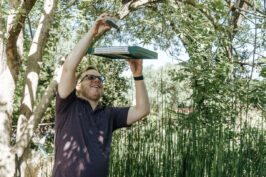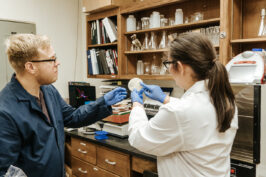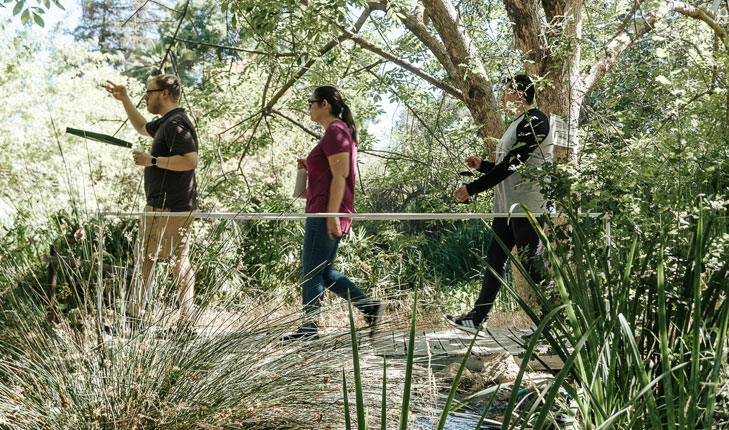The quarantines and remote work culture of the COVID-19 pandemic brought many back to nature. People spent more time in their backyards or in local parks, and this lifestyle shift led to a reported uptick in the purchase of bird feeders.
 While feeding birds and connecting to wildlife seems like a good thing, it can actually prove harmful to the animal population, according to Fresno State faculty. So when Fresno State biology professor Dr. Tricia Van Laar discovered a sick bird that died in her own backyard, she and fellow professor Dr. Joel Slade got to work uncovering a trend that is endangering wildlife — and possibly humans.
While feeding birds and connecting to wildlife seems like a good thing, it can actually prove harmful to the animal population, according to Fresno State faculty. So when Fresno State biology professor Dr. Tricia Van Laar discovered a sick bird that died in her own backyard, she and fellow professor Dr. Joel Slade got to work uncovering a trend that is endangering wildlife — and possibly humans.
The well-intentioned back-to-nature movement of the pandemic brought more bird feeders into the local environment. But bird feeders attract large numbers of birds and put them in close contact with one another. The feeders can act as breeding grounds for the spread of germs and disease from sick birds and dirty feeders. Diseases can spread between birds at the feeders, leading to more severe outbreaks of harmful pathogens.
Humans handling dirty bird feeders or sick birds run the risk of infection themselves. This is on top of an already rising issue of urbanization, causing avian habitat fragmentation and disrupting gene flow which may lead to greater illness risks, Slade said.
Shifting landscapes, new health concerns
By 2050, it’s estimated that over 66% of people will live in urban environments, highlighting the need to study the impact of urbanization on animal adaptability and survival. “How animals will cope with this shift and how disease will spread amongst both the non-human and human population are essential understandings as we continue to develop land,” Slade said.
Leading this work are Fresno State’s Slade and Van Laar, who received funding through the University Program for Education and Research in Biotechnology (CSUPERB) for their proposal titled “Salmonella in the City: Disease and Immunology in an Urban Songbird.”
They plan to study the differences in urban and rural house finches to discover the effect of urbanization on disease and immunity in urban animals. The bigger impact of this study is that “ultimately the data will help reveal the complex relationship between urbanization, disease and immunity in urban animals that has conservation and human health implications” for the future, Slade said.
A backyard mystery sparks discovery
 After the bird died in Van Laar’s backyard, she took it to her lab to run some tests. She discovered it had salmonella. “With the [avian] salmonellosis epidemic striking the U.S. and Canada, Dr. Joel Slade’s work is very timely,” she said. “Especially as we now know that salmonellosis occurs in wild birds in Fresno, since I found a pine siskin in my own backyard suffering from this infection. Unfortunately, it was fatal, and I am now concerned for local populations of feeder birds. I am excited for the results of this study and look forward to continuing our strong collaborations.”
After the bird died in Van Laar’s backyard, she took it to her lab to run some tests. She discovered it had salmonella. “With the [avian] salmonellosis epidemic striking the U.S. and Canada, Dr. Joel Slade’s work is very timely,” she said. “Especially as we now know that salmonellosis occurs in wild birds in Fresno, since I found a pine siskin in my own backyard suffering from this infection. Unfortunately, it was fatal, and I am now concerned for local populations of feeder birds. I am excited for the results of this study and look forward to continuing our strong collaborations.”
Salmonella can lead to one of many illnesses birds can contract from dirty bird feeders. Many scientists look to birds for signs of ecosystem health or as harbingers of disease. In fact, birds are strong biological indicators of environmental health.
“House finches’ innate immune system is good at fighting salmonella, but pine siskins are not good at it,” Slade said. “They are indicators of how the environment is doing. There could be pollution or diseases if there are issues with the birds.”
Slade knows birds. He studied field ornithology as an undergrad, and he regularly conducts avian research. Western bluebirds are still using the nesting boxes he installed with students in the past.
Fresno State research in action
For this study, Slade and Van Laar will work with three Fresno State students. Two will be graduate students either enrolled in the biotechnology or biology master’s program, They will be involved in experimental design, field and lab work and bioinformatic analysis. The third student will be an undergraduate student who will assist in gathering data from birds in the field and lab work. All three students will contribute to the manuscript and co-present the study’s findings at conferences.
“As a first-generation Latinx graduate student at Fresno State, I know from first-hand experience the immense anxiety and strain that is aggregated when keeping up with grad school, family and working multiple part-time jobs to stay afloat,” said graduate student Ramon Lomeli. “With the funding received from this CSUPERB grant, I will be granted the opportunity to focus and consolidate more time and effort into the project.”
The students will gain hands-on skills in genetics, statistical analysis, field biology, microbiology, core research skills and eco-immunology.
“Researching how salmonella interacts in urban environments and the birds’ ability to fight off the bacteria is essential for the conservation of local bird populations that are susceptible to the bacteria,” said graduate student Lindsey Biehler.
The study will involve monitoring bird-feeding stations on the Fresno State campus and at the San Joaquin Experimental Range. The scientists will routinely extract blood and gather bacterial swabs and fecal tests from birds at the stations to compare data measuring in vitro bacteria killing ability against salmonella between the urban and rural house finch populations.
DNA from the blood samples will be used to characterize immune genes that may differ between rural and urban populations, which may help explain the finches’ bacteria killing abilities.
“Being able to experience the work outside of a lab has been the most enjoyable experience in my three years at Fresno State,” said undergrad student Parmeet Kaur.
The data gathered will also be used for externally funded studies in the future on how humans may impact the evolution of the avian immune system, Slade said.
Slade offers seven safety tips for bird feeding and interaction:
- If you have a bird feeder, make sure to clean it regularly. The CDC recommends cleaning feeders at least monthly if not more often if bird feces are present.
- Wear protective gloves when cleaning.
- Use a bleach solution and rinse thoroughly, leaving no bleach residue.
- Make sure to wash your hands thoroughly after handling your bird feeder — even if you wore gloves.
- Do not personally handle sick or dead birds.
- Contact the Wildlife Rehabilitation Center if you see a bird that is sick or dead: https://www.fresnowildlife.org/ or https://www.crittercreek.org/.
- Be aware of local outbreaks.
- Take your bird feeders down if there is an outbreak.
- Check the local health department website for updates on West Nile virus, salmonella, etc.





